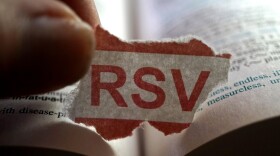Essential workers throughout the state who’ve tested positive for COVID-19 say they are being denied workers' compensation benefits. Four women recovering from the virus spoke out during a news conference hosted by the Connecticut chapter of the AFL-CIO.
We depend on your support. Donate to Connecticut Public today.
The state’s Workers’ Compensation Act does not consider contracting COVID-19 while on the job an occupational hazard, injury or disease, according to the AFL-CIO. In April, the Lamont administration said it would consider the gap, but it has not issued an executive order.
Diane Logan says it’s hard to wait.
“We’re here, we’re working, we want to be taken care of. We want someone to take responsibility because I am positive that I did get the COVID from work,” said Logan, an outpatient staff nurse at UConn Health and a member of University Health Professionals, AFT Local 3837.
Logan said she was paid for the first two weeks of work after testing positive in early April for coronavirus but has since exhausted all of her sick time in the nearly three weeks that followed. According to Logan, nearly two dozen of the 100 employees at her clinic have tested positive for COVID-19.
Virginia Ligi, a corrections officer at Cheshire Correctional Institution, said she and her co-workers started receiving cloth masks made by men incarcerated on-site after she tested positive for COVID-19 in March. She says she got “knocked off her feet” for three weeks.
“It was just the worst possible scenario in my head just because I have three young children at home,” Ligi said. “Being confined in my bed for nearly a month was so hard for me and my family.”
According to Ligi, the workers’ compensation claims she and others submitted were denied by Gallagher Bassett, the insurance agency contracted by the Department of Correction.
“This pandemic is a threat to the health and well-being of all front-line workers everywhere, whether it’s a correction officer, store clerk, hospital nurse -- we’re all doing our part to keep this world going, and it’s so difficult that they keep denying us everything that we should get,” Ligi said.
Advocates want the Lamont administration to establish a presumption that will open up workers’ comp benefits to essential employees who’ve been working during the pandemic.
“Without the presumption, insurance companies are going to say, like they're saying now, prove it -- prove to us you didn't get the virus somewhere else. That is not what we should be asking these essential workers to do,” said Eric Chester, an attorney for employees who’ve been denied benefits.
In early April, Senate and House Democrats wrote letters to the Lamont administration in support of expanding workers’ compensation conditions to include on-the-job exposure for essential workers during the pandemic. They said asking essential workers to prove that they contracted the virus while at work would “create undue barriers for those working to provide essential services to Connecticut residents.”
“Given your ‘stay safe, stay home’ executive order many of these workers have no other exposure to the COVID-19 than on the job,” read the letter from Senate Democrats. “What these individuals have in common is the constant, daily exposure to strangers as part of their job.”
The women all said their employers were slow in distributing PPE and sanitizing supplies as coronavirus spread rapidly in Connecticut.
“I bought my own wipes, my own Lysol spray,” said Denise Rogers, a Propark shuttle driver for doctors, nurses and other health care workers at hospitals in New Haven. “When I got sick, Propark did not want to admit or accept the responsibility that I got sick on the job,” said Rogers, who hasn’t worked since March 17 when she was hospitalized for breathing trouble.
In an email to Connecticut Public Radio, a Propark spokesperson said the company has been providing its employees with PPE and sanitizing supplies since the beginning of March as part of a “robust virus protection protocol” based on guidelines from the CDC, WHO and state Department of Public Health. Shuttle drivers in New Haven began receiving PPE on April 2.
“The decision on whether a claim is accepted is made by the workers’ compensation insurance carrier, not Propark,” said Dennis Safford, Propark’s assistant vice president of marketing and communications. “Should there be a confirmed case of COVID-19 that did originate in the workplace, we would absolutely provide our employees with the fullest resources available to them, including access to workers’ compensation resources.”
Prosight Insurance is Propark's workers' compensation insurance carrier in Connecticut.
Rogers and her husband, who’s a CTtransit driver, both tested positive in late March after another trip to the emergency room. Her husband is on life support. A nurse comes to check on Rogers, who’s at home recovering but “feels like she’s been in a war zone” as she continues to have symptoms.
Ligi, who has returned to work at Cheshire, said they’ve just started receiving N95 masks. The DOC has distributed different types of masks to its employees, depending on what type of facility and area they staff. Logan, the outpatient nurse, said they’re given one “paper mask” that they’re instructed to use for a week and put in a plastic bag in between uses.





